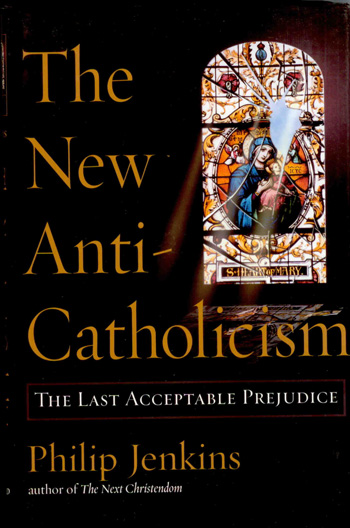 When the Pope visited Britain a few years ago one journalist remarked that the famous atheist Richard Dawkins was sounding more and more like the famous Northern Irish Presbyterian fundamentalist Dr. Ian Paisley.
When the Pope visited Britain a few years ago one journalist remarked that the famous atheist Richard Dawkins was sounding more and more like the famous Northern Irish Presbyterian fundamentalist Dr. Ian Paisley.
In his book The New Anti Catholicism, historian Philip Jenkins observes that the new wave of anti-Catholic bigotry fomented by the new atheists, homosexualists and radical feminists is in the same tradition as, and uses the same tactics as the classical Protestant anti-Catholicism which is a dark part of American history.
What comes across most vividly about the Protesters is their shrill tone, their irrational rage, and their lack of any real understanding about the Catholic Church. Increasingly, whenever I come across rage, negativity, blaming others, protest and narrow minded criticism I’m inclined to write the person off as an ignorant Mr or Mrs Angry.
That response, however isn’t best. What should we do when we are under attack? It happens in all sorts of human relationships – in the family, in the workplace, in the parish and school. What should we do when faced with protest and negativity?
No matter how hard, the first to do is listen. Is the complaint fair? Has there been a real injustice? Is something wrong that needs to be fixed? Then the criticism is a good thing. You take it as such and you thank the person for pointing out something that can be better, apologize and if it is in your power, get on with fixing what is wrong. If there is nothing you can do about it you say you’re sorry things have gone wrong, explain that it is beyond your power to do fix it, and move on.
However, that kind of protest is rare. More often you get whining and grumbling and blaming others or outright rage and anger. When that is going on, and there is no specific problem that can be remedied, the grumbler usually has a different agenda, and it’s worth listening more closely. Maybe they just want attention. Maybe they feel neglected and excluded. Maybe they have ideological disagreements with you and you’ll never appease them because they will disagree with you no matter what you do. Maybe they’re just an unhappy, wounded or sick person. If this is the case, move on. If you can’t help them, don’t expend the energy to reply because even a polite and kind reply will only make them madder.
Sometimes the grumbler is simply the kind of person who is only happy when they’re unhappy. They view the world as an imperfect place and everyone in it as imperfect people (except them of course) and you’ll never satisfy them. Maybe they’re one of those outsiders whose favorite hobby is to criticize anyone who seems to them to be the ‘establishment’. You have to understand that they like the ‘prophetic outsider’ role. It makes them happy to protest like that. They feel that it gives their life meaning and purpose. They feel special and unique when they’re unhappy. What’s sad about this type of grumbler is that not only can they usually not do anything about the problem, they usually don’t do anything even if they can.
This sort of protester personality type will never be satisfied, and they exist in just about every subset of religion or politics or in any community or workplace. For example, I’ve known some traditionalist Catholics who are like this. One of their basic foundational assumptions is that the ‘Vatican II Church’ is corrupt, probably invalid and that it is filled with the ‘smoke of Satan.’ You’ll never convince them otherwise and the Pope could come to them quoting Latin, wearing a fiddleback chasuble, smelling of incense and celebrating Mass with classical music and they’ll only say, “He’s even more dangerous when he’s pretending to be conservative.” Time to move on.
Likewise, I’ve known extreme progressives with the same underlying mindset. They’re convinced that the Vatican is totally hidebound, dangerously conservative and hell bent on turning back the clock. For them the Pope and his thugs are part of a medievally-minded, homophobic, misogynistic, out of date institution that wants only to enslave people. Let the Pope speak about the role and dignity of women, compassionate treatment of homosexual people and the rights and freedoms of all men and they’ll say, “It’s only window dressing. We want action not talk.” You get the idea. Time to move on.
The problem is not any particular group of people, but a mentality–a perspective–a paradigm. This ‘Protest’ way of looking at the world is essentially pessimistic. The Protester is an idealist. He thinks the world ought to be better than it is, and he is frustrated because he can’t make it better and he blames all the people in power for the world being so imperfect. This underlying ‘protest’ mentality conditions the way he looks at everything in the world so that before long everyone else outside his little group starts to look like the enemy.
Very often the protester is all too ready to blame others. Their inner deep unhappiness is always somebody else’s fault. Their world isn’t perfect, but it’s never their fault. It’s always ‘them out there’ – the ‘liberals’ or ‘the conservatives’ or whoever… There’s never anything wrong with them and their group.
So what’s the best way to treat a protester like this? Listen and learn and help them if you can, but if you want to see whether they are sane or not crack a joke about their protest. If they can laugh at themselves and see their complaint in perspective they’re ok. If they get mad or more mad and go all serious and self righteous you’ve got a protester personality on your hands. You’ll never make them happy. Wish them well and move on.
What else can you do? Don’t worry yourself because of the negativities. The negative you shall have with you always. Instead, be strong and of good courage. Rejoice in all things. God made the world to be a good place, and we are all created in his image. Life is good, if bad stuff does happen to you, be brave, be noble and bear your suffering with dignity and grace.
When you encounter the protester type, give him a big hug. He needs it.
Fr. Dwight Longenecker is the author of “Listen My Son” – a commentary on the Rule of St Benedict for families. Visit Fr. Dwight’s website to buy a copy here.
Fr. Dwight Longenecker is the parish priest of Our Lady of the Rosary Church in Greenville, South Carolina. He is author of thirteen books on the Catholic faith. Praying the Rosary for Inner Healing is available in Catholic bookshops and through his website: dwightlongenecker.com
Follow Fr. Longenecker on Facebook: http://www.facebook.com/frlongenecker
Please help us in our mission to assist readers to integrate their Catholic faith, family and work. Tell your family and friends about this article using both the Share and Recommend buttons below and via email. We value your comments and encourage you to leave your thoughts below. Thank you! – The Editors












